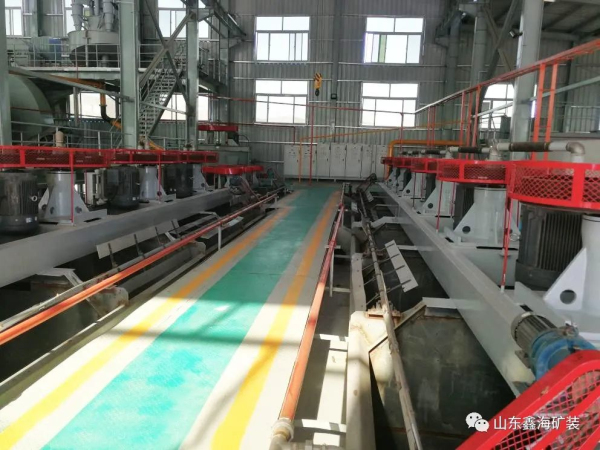In recent years, the price of lithium salt and lithium ore (spodumene ore and lepidolite ore) has been soaring. In the context of the rising share of new energy vehicles, lithium is even called the "white oil" in the new energy era. In this era of "holding lithium as the king", which miner does not want to seize the dividend period to do a big job? However, it is not enough just to have ideas and boldness. Only the blessing of lithium technology can let you take the lead. If you have spodumene ore, do you know how to process it into lithium carbonate? This article will introduce the technological process of lithium carbonate production from spodumene. There are only two key steps.

The content of Li2O in spodumene LiAl [Si2O6] is as high as 8.03%, and the content of Li2O in spodumene concentrate is generally 6.3~7.5%. In fact, the content is generally in the range of 2.91~7.66%. The spodumene is purified by reducing gangue mineral and impurity content in spodumene ore and increasing Li2O content. Generally speaking, the lithium extraction process of spodumene includes manual separation, flotation, magnetic separation, etc. However, the actual situation is that the mineral composition of spodumene is complex, and only one beneficiation process can not achieve the ideal lithium concentrate index, so the combined method is often used to complete the lithium extraction process of spodumene.
There are two common spodumene beneficiation processes as follows:
When the flotation magnetic separation combined process is applicable to the lithium concentrate obtained by flotation method and the lithium concentrate contains more iron, in order to obtain low iron spodumene, the magnetic separation method can be used subsequently to improve the quality of lithium concentrate.
There are two common flotation methods, positive flotation and reverse flotation.
Lithium extraction by positive flotation
Positive flotation refers to the process of preferential flotation of lithium concentrate. The finely milled lithium ore pulp is added to sodium hydroxide for stirring and scrubbing to remove the sundries on the surface, and then oleic acid and its soaps are used as collectors to float the ore particles into foam products in acidic media, and then lithium concentrate is obtained. The concentrate can be further processed to prepare lithium carbonate for use in batteries.
Lithium extraction by reverse flotation
Reverse flotation refers to the separation method of adding dextrin and starch regulators to the finely milled lithium ore pulp and lime adjusted alkaline medium to inhibit lithium concentrate, and then using cationic collectors to float silicate gangue minerals. In reverse flotation, the product left in the tank is spodumene concentrate.
According to the density difference between spodumene and gangue ore, the lithium ore with coarse grain size shall be separated first. Note that when the density difference between spodumene and gangue ore is greater than 0.2~0.5g/cm3, it is suitable to use a vibrating table or a jig for separation. When the density difference is less than 0.2~0.5g/cm3, the heavy suspension method can be used for separation. After desliming, the lithium ore after gravity separation can enter the flotation stage. The lithium concentrate after flotation will further remove iron impurities, improve the quality of lithium concentrate, and finally get a high-grade concentrate.
The production process of lithium carbonate is to transform the lithium concentrate for roasting, acidification roasting, leaching, purification, concentration, lithium precipitation, cleaning, drying, crushing and packaging. It has the characteristics of stable product quality, simple production process, full utilization of resources, low cost, etc. It is suitable for the production and application of lithium ion battery raw materials.
The basic principle of lithium carbonate production process is that sulfuric acid reacts with spodumene at 250~300 ° C to generate lithium sulfate. This reaction can only occur in spodumene with relatively loose structure. First, spodumene concentrate obtained from beneficiation is calcined in a rotary kiln at high temperature. After cooling, it is mixed with sufficient sulfuric acid and sent to a 250 ° C acidification rotary furnace for sulfuric acid roasting. After cooling, soak in water, add limestone to control the PH value to obtain crude lithium liquid containing about 10%, adjust the PH to 11 with lime, and add sodium carbonate to remove impurities such as calcium, magnesium, iron and aluminum. The purified lithium sulfate solution containing about 20% is weighed by evaporation of the clear solution, and sodium carbonate is added to precipitate into lithium carbonate. The lithium carbonate product is obtained by centrifugal dehydration with a recovery rate of about 90%.
The lithium carbonate production process has a high yield of lithium carbonate. Spodumene and sulfate are mixed and sintered to produce lithium carbonate. After a series of physical and chemical reactions, the aurelium element in the sulfate added will replace lithium in the ore to generate soluble sulfate, and the main impurities will generate compounds that are difficult to dissolve in water. Then the sintered clinker will be leached and separated, and lithium ions will enter the solution for purification, concentration The lithium carbonate product is obtained after precipitation.
After the above two steps, the processing process from spodumene to lithium carbonate is completed. Further processing of industrial grade lithium carbonate can produce lithium hydroxide, battery grade lithium carbonate, lithium chloride and high-purity lithium carbonate for different industries.